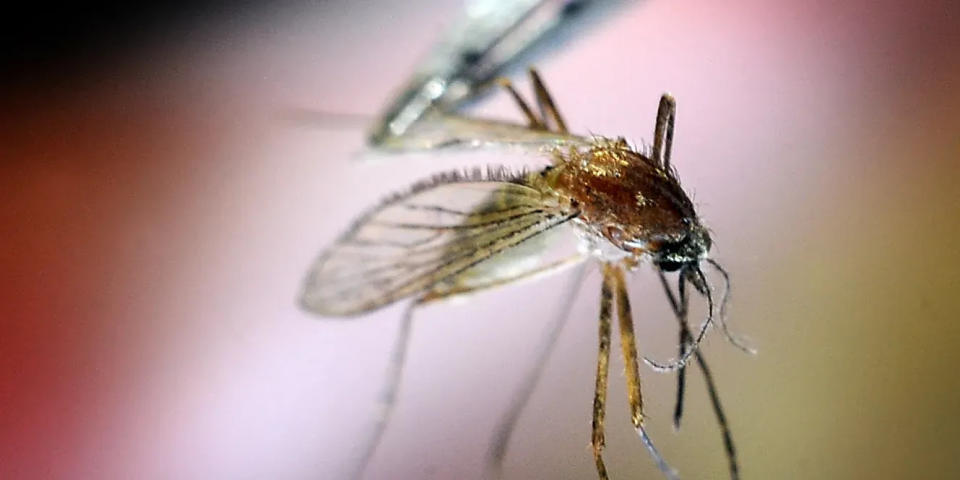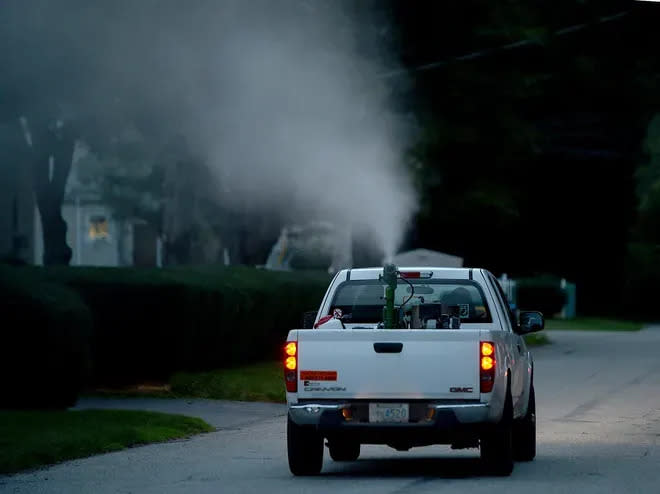Northborough agency protects MetroWest towns from virus-carrying mosquitoes
With summer as peak mosquito-breeding season, local health officials are on high alert through September for a potential rise in cases of West Nile virus and eastern equine encephalitis (EEE).
Given the mild winter, mosquitoes bred earlier, increasing populations and people’s risk of contracting these viruses in the fall.
More: When will your community get sprayed? Check here
“We do weekly testing and trapping in that time frame (mid-June to September) to make sure that if there is a virus there we hope to capture it before it gets over to the human population,” said Tim Deschamps, executive director of the Central Mass Mosquito Control Project (CMMCP), which is based in Northborough.

The agency schedules spraying of several communities throughout the summer, targeting highly mosquito-populated areas such as near wetlands. Specific locations are published on its website by 3 p.m.
Deschamps said the spray is safe for humans, wildlife and produce. The CMMCP uses a low-concentration repellent (a 4% solution) and the types of pesticides used are not residual — which will keep vegetable gardens safe. Washing produce with soap and water “as they would normally do would be just fine,” he said.
Workers typically spray areas at night, making human exposure “practically nil.”
Local spraying schedule
Communities that were scheduled to be sprayed on Friday include Natick, Marlborough, Sherborn, Southborough and Westborough. On Monday, areas in Ashland, Northborough, Hopedale and Milford will be sprayed with these pesticides. Hudson, Holliston and Hopkinton are up on Tuesday.
Framingham, Sudbury and Wayland are covered by the East Middlesex Mosquito Control Project, which is based in Waltham.

Spraying schedules are uploaded about two weeks before the beginning of each month and notices are sent to city and town officials, as well as boards of health. Residents can call 508-393-3055, as schedules are also posted every day after 3:30 p.m.
People who don't want spraying near their homes, or those who wish to have the CMMCP specifically spray their homes and private properties, can call that same number.
More: Dept. of Public Health announces state's eighth human case of West Nile virus
Natick Health Director Mike Boudreau said the town performs regular monitoring along with the CMMCP’s spraying schedule.
“Central Mass Mosquito Control is essential to what we do … in my years of dealing with them, they’re very responsive and report to us regularly,” he said.
If a resident has an abandoned swimming pool, for example, the agency will treat it as stagnant water, which can be a hub for virus-carrying mosquitoes. Boudreau said people should also be on the lookout for standing water in old tires, buckets and birdhouses.
Boudreau said Natick also receives arbovirus testing reports from the Massachusetts Department of Public Health.
The CMMCP also monitors thunderstorms, other kinds of weather and areas with high water levels — which all attract more mosquitoes — to set more traps and control measures in place.
However, MetroWest is in a moderate drought, according to Deschamps, which makes the agency concerned about a specific species of mosquito: Culex.
“They develop in very high bacterial areas, so drought conditions tend to be more favorable for that species,” he said.
To keep their numbers in check, the CMMCP will disperse bacterial products in catch basins, storm drains and certain city streets that hold water longer and can harbor high levels of bacteria because rain is not flushing it out.
More: Woman in her 80s is this year's first case of West Nile virus in Massachusetts
For people in areas with large mosquito populations, Deschamps recommends buying a repellent approved by the EPA. But, “the best thing they can do is listen to public health alerts,” he said.
Who's most vulnerable?
Most vulnerable to the West Nile virus are the elderly, pregnant women and people with compromised immune systems. The EEE virus “can cause significant damage to most people, even healthy ones,” but it is rare, Deschamps said.
Boudreau recommends that residents avoid outdoor activities between peak dusk and dawn, turn backyard plastic pools upside-down when not in use, make sure screen doors are in good condition and use oils — such as lemon and eucalyptus — to keep mosquitoes out of the house.
Signs of exposure to the West Nile or EEE virus are sensitivity to light, extreme headaches, general discomfort and high fevers.
“At this time of year, if anyone is experiencing those symptoms, they should go to their doctor … and determine what the best course of action would be,” said Deschamps.
The CMMCP was created in 1973 by the state Legislature after about two dozen MetroWest communities began experiencing an increase in EEE cases. Since the agency's establishment nearly 50 years ago, there have been sporadic EEE outbreaks, Deschamps said.
Over the past three years, “we have been doing enhanced larval control procedures to try and minimize those species that can carry the EEE virus. Thankfully, we have not seen any emerge again since that time,” he said.
Today, the agency covers 44 communities in Middlesex and Worcester counties.
CMMCP is a year-round program that offers a wide range of services. Some include: a ditch maintenance and beaver mitigation program (both reduce mosquito larvae from developing in those areas), a tire recycling program, larval control program where technicians monitor wetlands, and educational programs that send biologists and entomologists to schools and other organizations to teach mosquito biology and personal protection measures.
This article originally appeared on MetroWest Daily News: Spraying low-grade pesticides prevents outbreaks of West Nile and EEE

